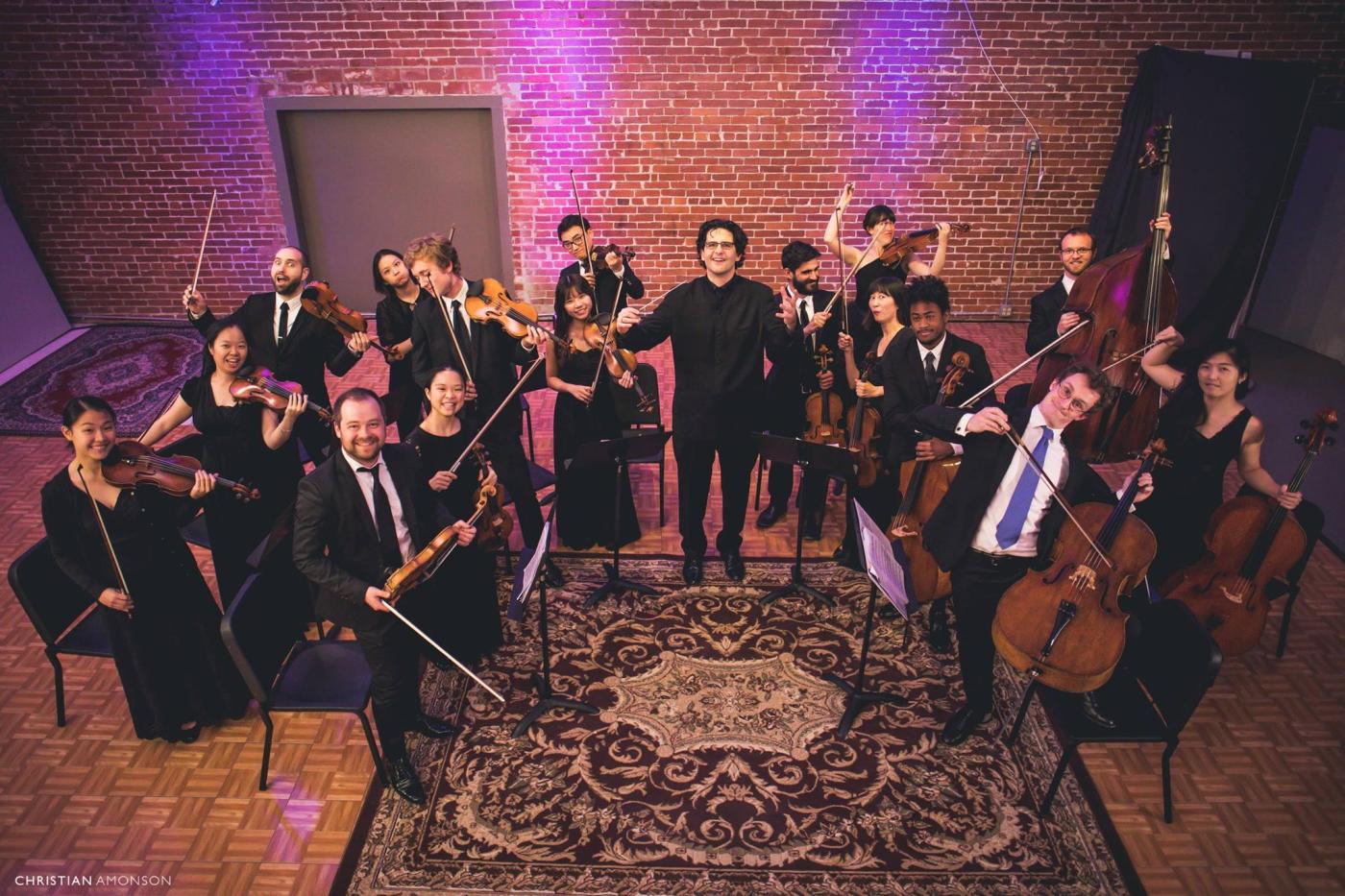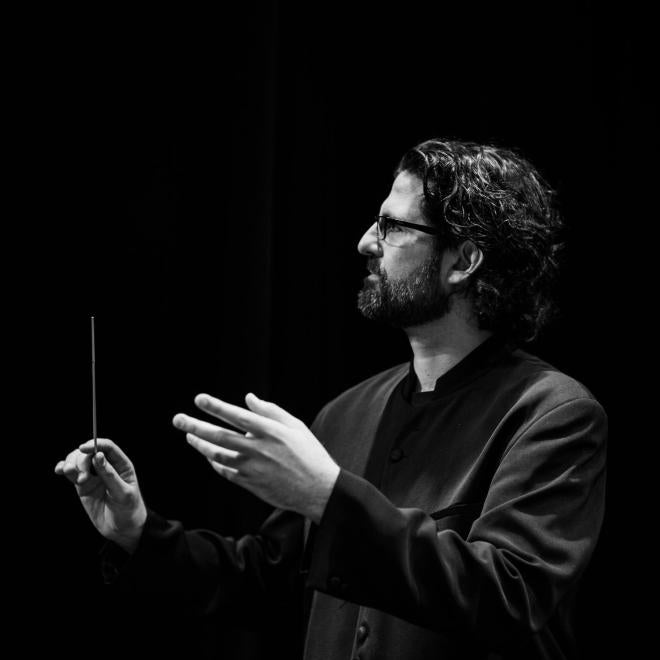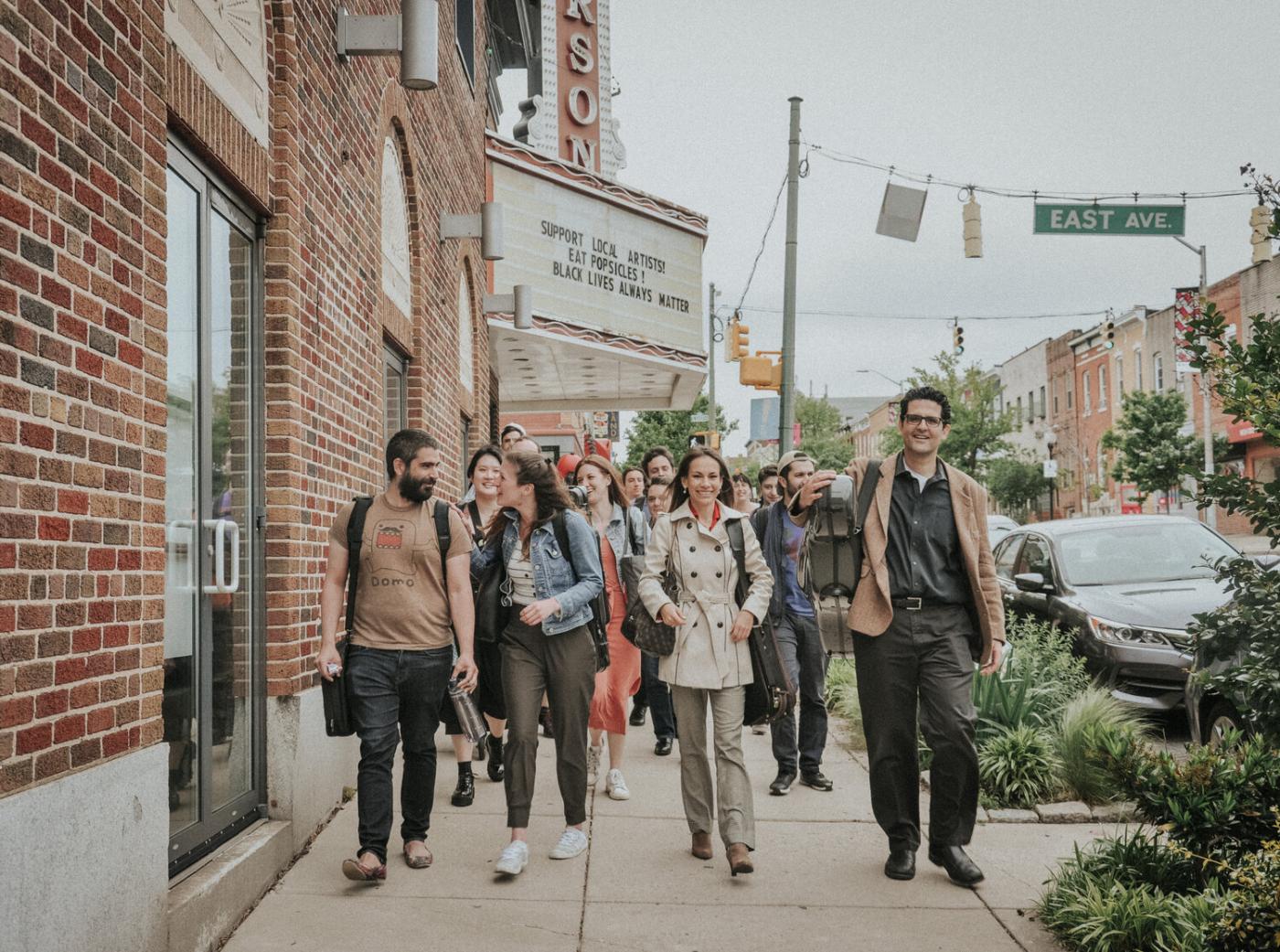The Washington, D.C./Baltimore region is home to many fine performing arts organizations. One, however, is unique: Mount Vernon Virtuosi (MVV), a string chamber orchestra made up of performers who are evolving from classical musical training to a professional career. The ensemble was founded by internationally acclaimed cellist, conductor and pedagogue, Amit Peled, who also serves as its Artistic Director. WETA Classical listeners are familiar with Mr. Peled’s intelligent, sensitive performances. (Read an interview with Mr. Peled about his Bach journey here)
MVV is based in Baltimore, where Mr. Peled is professor of music at the Peabody Institute at Johns Hopkins University, a post he’s held for 20 years. But the group performs free of charge throughout the greater Baltimore/Washington, D.C. area, much to the delight of audiences who appreciate skillful, innovative concerts. And, in the true sense of a musical institution engaged with its community, MVV is involved in educational initiatives with schools, prisons, hospitals, and community groups.
MVV’s 2023-24 season starts this month and runs through May. The season opener, “From Bach to Kol Nidrei”, will be presented in three venues: Enoch Pratt Library in Baltimore on September 22; Emmanuel Episcopal Church in Baltimore on September 23; and Bender JCC of Greater Washington, D.C. in Rockville on September 24.
Mr. Peled is passionate about MVV and its mission, so we took the opportunity to get his thoughts, along with a preview of the upcoming season.
Linda Carducci: With Mount Vernon Virtuosi, you’ve found a valuable niche that serves audiences of multiple demographics while providing young, skilled musicians with a performance platform. Would you tell us more about MVV’s mission and its young artists --their backgrounds and alumni who have made their way in the professional music industry?
Amit Peled: Mount Vernon Virtuosi was established in 2018. This was the 15-year mark of my teaching at Peabody and after that many years I had experienced a situation where wonderful cellists, and other instrumentalists since I also teach chamber music, have graduated and immediately started looking for another place to live and make their career and livelihood. I was a bit frustrated about it because those young, extraordinary musicians could have been a great addition to our community here in Baltimore and in Maryland. I wanted to think of a way to keep them here.
So when I started MVV, one of the two main goals was to try and create jobs for those young artists that are in that kind of bubble between finishing college and getting a job. I wanted to try to keep them here in Maryland so that they might consider living here. Now, keeping them here would require them to have work and money so I decided to establish an orchestra that will pay well. However, at the same time, and as important if not more, I wanted this orchestra to provide free-of-charge concerts for the community.
The model I always admired was the Esterhazy Castle in Germany where Haydn was hired as resident composer. He was asked by the owner, Esterhazy, to provide an orchestra of really top musicians and to write symphonies for the aristocracy and their friends. So I thought: what if we can create the same model where we have an orchestra that is paid by donors but produces music constantly for the community for free? Thanks to Esterhazy we have 104 Haydn symphonies now. I thought, what if I can have that model where I take away completely the ticket sales and all those problems, the nagging of “Oh, we cannot sell tickets in classical music” and we just give it away to the community for free? I might interest people that maybe even don’t care to go to concerts but want to have something like it in the community.
So the two main legs of Mount Vernon Virtuosi are to keep the musicians here who just finished college and at the same time to provide free-of-charge concerts for the community. When I started, I didn't believe that we would exist five years later and now we're celebrating our sixth year!
Of course, those two legs have expanded to much more community work and now we also have our big project, The Music House, where I want to host the musicians for a two-year residency. They will live free-of-charge completely in an area of need in our community. While doing that they will kind of make a stamp in the community and, more importantly, will integrate with the community. So as I see MVV grow to our tenth anniversary, I hope that our 15 musicians will be able to live within the community in an area of need, be part of the community, teach in the schools and play free-of-charge concerts in the area. So instead of imposing a classical music concert, we will be part of the community.
And I have to add that in our teachings, in the program we do, Every Child Deserves a Voice, we base our teaching on the gospels and the original melodies that were developed here in Baltimore, here in Maryland. Instead of imposing the Suzuki system on the kids, we try to listen to them and to see what melodies they have learned in churches, schools and at home. We try to find a way to teach them the instrument through those melodies and it has been a great success and very special to see the excitement with these kids. So we are doing many things with the orchestra now but the main goal would be to put everything together into one house where all the musicians would live free-of-charge, free of angst of being scared of paying rent right after college and just concentrating on developing as musicians and ambassadors of music while at the same time working for the community.
LC: MVV is a string orchestra. Is its primary repertoire works composed solely for strings, or do you include string transcriptions of scores for other instrument groups?
AP: The primary repertoire that we play is for strings and there are amazing pieces. For example, we are starting this season in a few days with Dvorak Serenade which is one of the most monumental pieces for string orchestra. We play arrangements at almost every concert, too.
I would say the highlight of each concert is us singing a Bach chorale. We simply find a chorale in the key of one of the pieces we are playing, and everybody plays it and then immediately after sings it. We try to find our voice through original compositions, through our actual human voice and through pieces that are written for us. I will talk about that more in the next question about “Made In Maryland.”
Also, once a year we expand the orchestra to strings and winds for “Mozart In Jeans.” We always do a symphony by Mozart that includes two oboes and two horns. This has been a great joy not just to add those musicians to our family but also to add that sound for our community and for our musicians who are still training to become musical ambassadors.
LC: I’m intrigued by the “Mozart in Jeans”, “Made in Maryland”, and “Mount Vernon Virtuosi Cello Gang” concerts scheduled this season, as well as the season opener. Will you tell us a bit about those and any other highlights of the upcoming season?
AP: We do four projects every year. I like people to have titles that are easy to remember. Titles that are successful, we try to repeat them.
Every year we play “Mozart in Jeans”. This has been done since the first year of our existence. It is us trying to become part of the community and trying to show that classical music is not an enemy, not something you have to dress up for and not something you have to behave differently for. It’s something that is for the people. I myself love wearing Levis jeans. These are my day-to-day trousers. I thought that if we play a concert, Mozart, one of the great pearls of music, and we dress up in jeans and white shirts, we show that for us it's not about how we look but how we sound. “Mozart in Jeans” has been a highlight of our season every year. This year we’re inviting world renowned violinist Ulf Wallin from Berlin, Germany to join us for Violin Concerto No. 1 and then we will do Symphony No. 24 and an overture, all by Mozart. This will be a great highlight that we try to do around the holiday season, so it becomes even more festive
The “Cello Gang” is another highlight. It’s where I’ll play with 3-6 cellists from the orchestra. We like to use 3 current players and 3 former players, so it becomes 7 cellists. We usually title the concert “Around the World in Seven Cellos”. It’s a chance for me to do what I do daily, which is being a cellist, with my musicians and not just conduct them. We love that program; we've recorded CDs with the “Cello Gang”, and we present many arrangements for this ensemble. It's a real joy to share this program annually.
“Made in Maryland” is a new initiative of our orchestra. This will always end our seasons from now on. The intention is to glorify what we do here not just as players, or musical athletes, but also as champions of music that has been composed here in Maryland. Every year we will feature current living composers who grew up, studied in or are now living in Maryland. This year we have a wonderful composer, Andrea Casarrubios, whose piece we will play. She studied at Peabody and also, being a cellist, she will perform a piece that she composed for herself with string orchestra. Diana Rosenblum will also be a composer on the program, and we look forward to playing her piece as well.
We will also showcase a young composer in a competition that we start this year: The MVV Composition Competition. Every year we will choose a theme by a significant Maryland person and the composers will have to compose a piece up to ten minutes inspired by that theme. It’s open to all students who are currently studying in Maryland higher education. There is a cash prize of $1,000. It’s to encourage composers who are studying now in Maryland to have an opportunity to have their piece performed three times in our concerts.
So, all three titled programs are really important for us and for our mission, and then the beginning of the season, the season opening, is always something different. This year, in a few days we have a program titled “From Bach to Kol Nidrei” and we will celebrate the Dvorak 3 Serenade, along with the Bach Air on the G String, and we will finish the concert with Bruch’s Kol Nidrei since this weekend is the weekend of Yom Kippur. Kol Nidrei is, of course, the most significant prayer in the Jewish religion which happens in Yom Kippur, so we will be able to share with the audience that beautiful piece by Bruch for cello and strings.
We also have kids’ concerts where we play the program and invite the kids to come join us on stage for the last piece. It’s really fun -- this happens at the Bender JCC in Rockville. Our three concerts are usually Church Emmanuel in Baltimore, Pratt Library also in Baltimore and Bender JCC in Rockville so that we give a chance to people from different areas of Maryland to join us in concerts, always free of charge.
Thank you so much for the chat, and we really hope that people will come to our concerts!
More information about Mount Vernon Virtuosi is available at https://www.mountvernonvirtuosi.com.
PBS PASSPORT
Stream tens of thousands of hours of your PBS and local favorites with WETA+ and PBS Passport whenever and wherever you want. Catch up on a single episode or binge-watch full seasons before they air on TV.


